Living Your Values
We Didn’t Get Here From Hard Work Alone
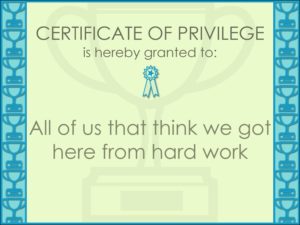 It’s easy to attribute hard work to any kind of career success we have.
It’s easy to attribute hard work to any kind of career success we have.
“I worked hard in high school; that’s why I got into this prestigious university.”
“I worked hard in college; that’s why I was hired at this great job.”
“I worked hard on this project; that’s why I got a promotion.”
OK, so we did our homework and studied for tests. We carefully completed the applications and were scrupulous with our resumes. We figured out what our managers wanted and delivered it.
It was hard work.
But.
That hard work is often the effort used to capitalize on our fortunate circumstances. We can convince ourselves that we deserve our success, that we earned it, because we put a lot of time and focus into achieving it.
Hard work is honorable. Working towards a career goal is admirable.
Yet.
Hard work alone did not earn us our achievements.
Someone read and accepted our college application. Someone permitted us to interview for the job and someone made the decision to hire us. Someone favored us with the promotion or raise or award.
Someone decided we were qualified, acceptable, and perhaps more worthy than others aspiring to the same position.
Because they are human, those someones have their own ways of evaluating us. Their experiences and their environment influence their perspectives. They may be aware of their ingrained biases and work to overcome them. Or they may unaware of unconscious biases, or disbelieve that they exist.
Unconscious bias does exist.
Overt bias also exists in plenty of people who believe certain people are inferior, threatening, or sinful.
If we are a combination of any of these factors, we have benefited from other people’s biases regardless of whether it was intentional:
· White
· Heterosexual and cis
· Male
· Tall (unless you’re a jockey)
· Body and face considered normal and attractive by societal standards
· Attended decent primary and secondary schools
· Wealthy parents
If we have some of these characteristics – and I do – we have benefited from them.
If we don’t admit our undeserved advantages, we get to believe we earned our slot by working hard. We also get to believe that other people should work harder if they want what we have and it’s their own fault if they don’t. We can then support this line of thinking by pointing to people who achieved great success despite the odds.
It’s very American to hail the underdog achievers and the rags-to-riches stories. However, these examples stand out precisely because they are not the norm.
When we’re surrounded by other privileged people and the exceptional outliers, it’s easy to assume everyone else’s lack of success is due to a lack of effort. We might even believe that if our advantages had been stripped away, we would still be accomplished.
Believing it doesn’t mean it’s true.
I acknowledge my privilege and the role it plays in my education and career opportunities.
Your Ethics Can Get You Fired
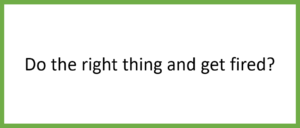 Maintaining a positive reputation at work means that sometimes you don’t speak up when something’s wrong. We all know the sayings, “don’t rock the boat” and “pick your battles.” When the issue goes beyond a gray area, or a slight bending of the rules of the employee handbook, you’re in a tough position.
Maintaining a positive reputation at work means that sometimes you don’t speak up when something’s wrong. We all know the sayings, “don’t rock the boat” and “pick your battles.” When the issue goes beyond a gray area, or a slight bending of the rules of the employee handbook, you’re in a tough position.
Several years ago I had a conversation with two mid-career lawyers about sexual harassment in the workplace. Both of them said that they would not tell their firm’s HR department or file a complaint if they were sexually harassed. They were sure that they would be fired in retaliation and black balled in the legal community, preventing them from getting a new job in their field.
I asked what they thought about the moral obligation to report issues like this. Because if nobody takes a stand against harassment and discrimination crimes, then they will keep happening, both to the current victim and others. The two lawyers didn’t hesitate to say they wouldn’t ruin their careers over it.
Over the years I’ve heard many variations of that conversation, but this stood out because the people were lawyers. They understand the law, their rights, and the process to seek justice if wrongfully terminated.
They also understood the personal consequences of reporting a crime and decided it isn’t worth it.
That’s bleak, and probably why we admire some whistleblowers who expose large scale crimes in their workplaces. Calling out illegal activity is a huge personal risk. Up until the point when whistleblowers are national heroes talked about in the media, they might be considered by their company’s peers and managers to be rats, tattlers, trouble makers, whiners, complainers, and ungrateful losers who should have been happy they had jobs in the first place.
They might be called all of those things and also be freshly unemployed. With a bad reputation that makes it difficult to be hired elsewhere.
Other people told me stories about being instructed by their managers to lie to investigators about crimes they witnessed. One man admitted that he lied under oath in trial court because his supervisor demanded that he do so or else lose his job.
Where do you draw the line between self-preservation and ethics?
I’m guessing most of us think we would make the ethical choice if we were in situations like that. But when people are actually in a position to lose their livelihoods, I doubt it is such an obvious decision.
I’m glad there are some people brave enough to sacrifice their personal wellbeing to stand up to workplace crimes.
Choosing Who to Confide In at Work
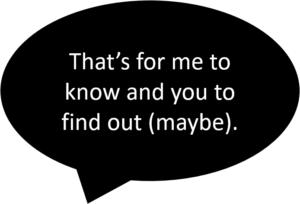 The people you work with are often either the best or the worst parts of your job. When those relationships are positive, it can make you more productive, successful, and happier.
The people you work with are often either the best or the worst parts of your job. When those relationships are positive, it can make you more productive, successful, and happier.
When the other parts of your job aren’t going well, having trusted colleagues to confide in can help you get through the day.
Whether they are work friends, your staff, your boss, your peers, people in organizations that work with your organizations, Human Resources – anyone involved with your work – think twice before sharing confidential information. Telling the right person your secrets can strengthen your bond and make the relationship more important to both of you. Telling the wrong person can damage your reputation and career.
Who to trust with specific information can depend more on the individual’s personality than their* position in the company, but there are some common factors to keep in mind.
When You’re Looking for a New Job but Haven’t Accepted an Offer Yet
Your boss: Almost always no.
If you have a positive relationship with them, you might think they would appreciate knowing that you intend to leave before you turn in your two weeks’ notice. However, generally level-headed people can still take it personally, as though you are leaving them not the job. They might also be resentful that they will have to deal with hiring and training a new person and managing your workload until the position is filled. If your news overlaps with performance review timing, you could be punished for disloyalty.
There are only two circumstances when telling your manager may be better than keeping it to yourself. The first is when your boss has explicitly encouraged you to grow your career by taking advantage of job opportunities. The second is when you’ve witnessed your manager supporting other team members who have left the team.
Your employees. No.
Telling your staff that you plan to leave will make them worry about their own jobs.
Your peers. Usually not.
Even your work friends may be jealous or not want you to change the dynamic in your organization. You might feel guilty withholding this information, as though you are being a bad friend. It is more useful to remember that a lot of things can go sideways until you have a signed offer in your hands. It’s much better to wait and share the good news once you’ve landed a position.
The exception is when you need a work reference and can count on a peer to help sell a recruiter on your capabilities.
Health Issues
Your boss, your employees, and your peers: It depends on their personality.
For every person I know who had workplace support through a significant illness, I know of another person who was made miserable during the experience, or even pushed out of the company.
If you’ve got doctor-ordered treatments that take you away from the office or cause obvious physical changes, you don’t have a choice about whether to keep it a secret or not. With other illnesses, it can be difficult to know if you will be supported or punished. The best you can do is evaluate the level of empathy your management has shown for you and others.
You may be able to confide in your manager but keep it a secret from your peers and staff.
Human Resources Issues
Your boss: If your workplace requires it and/or they will actually help you.
If there’s something going on that violates company policy, it’s not paranoid to consult the employee handbook to understand your obligations. If for example you witness employee theft, the policy likely requires you to step forward or else be punished if caught.
If you are thinking about going to your HR department about a workplace issue, remember that they are there to protect and support the organization first. Anything your report is likely to be shared with your manager.
It’s tough to be in a situation where reporting an issue may be the ethical thing to do but puts your job at risk. The media reports on big whistle-blower cases and employee lawsuits. We don’t hear about the other thousands of instances when an employee is forced out or fired for calling attention to a problem.
Your employees: Nope.
Your peers: Probably not.
Unless you and your peers are collectively talking about an issue, it is in everyone’s interest to keep it to yourself. You don’t want to drag other people into situations that could put them at risk or get you in trouble for revealing information that you’ve been asked not to talk about.
Other Personal Stuff
Your boss, your employees, your peers, and everyone else in this world: Share with caution.
When you have Other Personal Stuff impacting your life, of course you need to talk about it with others. Talking helps alleviate some of the burden, and unless you’re a robot, you need some support.
Just be careful who you confide in. People that are otherwise pleasant and even caring towards you might react in unhelpful ways.
Of course if you have any doubt that they might share your personal information with other people: avoid! It’s not worth it. People love to gossip. Don’t become their story of the week.
Many people do not deal with Other Personal Stuff very well. It might be too uncomfortable for them, or they don’t know how to respond. That sucks, but it is kind of understandable. Some people just don’t realize that when in doubt, any of these work: “I’m sorry to hear that. That sounds stressful. Are you ok?”
Worse than clueless but benign people, though, are people who respond so badly that they make your situation worse. Bad responses might be downplaying or denying your situation, victim-shaming, or telling you how you should be coping. On top of whatever issue you’re experiencing, then you have to deal with being blamed or shamed, feeling betrayed, or feeling alone in a situation where you need help from others.
Unfortunately, it can be hard to tell who is unsafe to confide in until it is too late. Friends and family members are just as likely to respond badly as your coworkers. So don’t spill your guts. If there’s someone you feel compelled to share your story with, get a feel for their reaction before you provide the details.
With all people and all topics
Remember that once you tell anyone personal information, you lose control of it and who else they might tell.
*I’m using the plural for he/she/his/her because using “he” alone is gender-unfriendly and writing “he or she” is annoying.
Dream Big, They Said
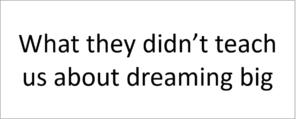 Remember when we were little kids and we were told we could do anything we set our minds to? We heard it mostly in grade school, but also in after-school programs and from parents.
Remember when we were little kids and we were told we could do anything we set our minds to? We heard it mostly in grade school, but also in after-school programs and from parents.
We were told inspiring accounts of people who achieved great things. We learned of career options from astronaut to president and told we could have those jobs. We were taught about Mother Theresa and Martin Luther King Jr and told we too could do big work with a big impact that helped many people.
We were told to dream and work hard. We could do great things in our lives. We just had to make up our minds and go for it.
Teachers and the others – they can’t very well NOT say those things. Where would we be if we hadn’t been told to have dreams and try to reach them?
I wish, though, that we had been taught what to do when things go wrong in our pursuit of our big dreams. And what to do when life squishes our dreams before we even really attempt to achieve them.
I think it happens as early as high school – when we trade in our grand ideas for more practical matters. Our awareness grows. We understand what we hear on the news and its implications in our own lives…jobs and joblessness, natural disasters, war…
There are also timelines to consider. Preparing for the first job out of high school, or attempting to get into college and then deciding what to study. And then graduating and needing a job and a place to live.
After college I wasn’t dreaming much. I enjoyed my life and dove into the beginning of my career, but looking back, I can say my dreams were replaced by goals.
And my goals – at least the biggest two that I accomplished in my adult life so far – didn’t even come from a strong desire within myself to achieve something meaningful.
Instead, they were inspired by obstinacy.
It is true that since college, if not earlier, I vaguely expected to get an advanced degree at some point in my life. However, it wasn’t until I was rejected from a year-long marketing certificate program that I was motivated to get an MBA. My exact thinking was, “Seriously, I was turned down for a certificate? Screw them, I’m getting a master’s degree.” Some rigorous GMAT prep and five years of school later, I had my degree. Ultimately, I was glad I was refused participation in the certificate because it turned out to be a fraction of what I wanted to learn and was capable of achieving.
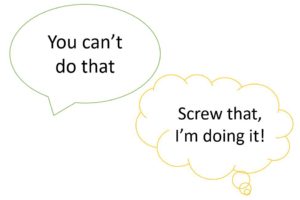 My second example is only slightly different, in that I hadn’t thought about home ownership as a goal at all. I was about to give up my apartment to move to another place with someone when circumstances changed and obstinacy kicked in again.
My second example is only slightly different, in that I hadn’t thought about home ownership as a goal at all. I was about to give up my apartment to move to another place with someone when circumstances changed and obstinacy kicked in again.
I decided I would make housing plans on my own and buy a place instead of renting. I made a budget in excel, put as much as I could into the down payment and fees, and then I owned a home.
I didn’t need to learn to use rejection and setbacks as motivation but I think it should be taught. I hear too many stories from older writers and artists who put down their pens when they were young adults because somebody told them they weren’t talented. It seems like it would be a very useful lesson plan to prepare kids for when they are told no, they can’t, they aren’t good enough, to muster a “screw you” attitude and pursue their art anyway.
Another skill that I wish I had been taught in school is how to channel disappointment into something useful. I get depressed by civic issues of inequity and discrimination and need more than the grade school equivalent of a lemonade stand that raises money for these causes. My stabs at educating myself, speaking up, and seeking out groups to participate in seem the right steps for now, but I was floundering for a long time.
The lemonade stand fundraiser is great to show little kids that they can take initiative and tangibly provide support for causes. But then the cups are put away, the money is donated, and life goes on. What’s missing is sustained effort, and follow-up to see what impact was made. An analysis to determine what about the effort was successful and what can be done to improve. Or how to translate lessons learned into the next effort.
Some of my good friends share this sense of civic-work malaise. We have a sense of being pushed to put our skills and experience to better use. Even people who are working in non-profits or who are on the board of multiple civic groups are unsettled and feel there is more they should be doing. There is a limit to how many action committees a person can reasonably join, so it seems failure to achieve the desired impact is the problem. We’re falling short of our big dreams to make a big impact.
Wouldn’t it be great if we were taught throughout school how to be patient and sustain efforts over a long period of time, even when we don’t see the results we want? I remember being taught about Abe Lincoln’s personal and professional setbacks before he became president. He had business debts that took years to pay off, was a self-taught lawyer, and lost his first attempt to win an Illinois state legislative position.
What isn’t clear is what motivated him to keep pursuing his dreams.
I wonder if he was driven by a belief that he had something to offer people. Maybe he resolved to keep trying, and to look for ways to use his abilities to be of service.
What we do know is that he said yes to opportunities. Clearly he didn’t let fear of failure prevent him from going into business, becoming an attorney, or running for public office. After each misstep, he came back with resilience. Whatever doubts he might have had about his abilities to perform in those professions didn’t stop him from showing up and doing his work.
I didn’t learn these things in school, although I wish I had.
I’ll keep using obstinacy as fuel when people tell me I can’t do something I want to do. I’ll try to be patient with setbacks and keep ahold of my belief that I have something to offer, even when I don’t see progress.
You too, ok? When someone tells you no, go ahead and prove them wrong.
And keep the faith. You’ve got something to offer.
What Makeup Taught Me About Business
 Or an alternate title for this post: My Fake Beauty Blog.
Or an alternate title for this post: My Fake Beauty Blog.
I like makeup. I like learning about new products, talking about them, trying and buying.
I did a great job of limiting the buying part for a couple of years. Then I had a streak of steady paychecks from my consulting work and suddenly the pursuit of the perfect moisturizer seemed like a good hobby. I found it after a long quest through many mediocre creams, oils and balms. It is Peter Thomas Roth’s Mega Rich Intensive Anti-Aging Cellular Crème, which provides hydration for my dry-combination skin longer than any other I’ve tried.
After that I needed a new hobby – like finding the ideal matte plum lip color. Which as it turns out, is Benefit Cosmetic’s Lollitint Cheek & Lip Stain. You see how quickly this gets out of control?
Eventually I reigned it back in.
How?
I did my taxes and my checking account became as empty as my tube of Dior Addict Lipstick in Rock’n Roll 750 that I finally finished. And won’t repurchase because Dior is not worth the hype. The best thing about Dior products is feeling like a snob for using them. Like the time my friend and I got out our powder compacts at the same time and she said her Lancome was about the same as my Dior. I laughed so hard and she said I was a total snob, which I’m laughing about again as I relay it now, as if it was a compliment.
But really, Lancome powder is better than Dior’s. And Too Faced Primed & Poreless Pressed Powder is better than both of them, and is also better than the Cover FX that I’m using now because I wanted to try something new.
Anyway, once again my Sephora problem has vanished just as the dark circles under my eyes vanish when I use Urban Decay’s Naked Skin Color Correcting Fluid.
Now I’ll have to get my makeup at Ulta – ha ha.
Just kidding! Ulta is not completely low-end. Ulta stocks It Cosmetics and Sephora doesn’t.
I just wish Ulta’s emails and circulars weren’t so stark. I hate the incongruence of reading about It Cosmetics’ Your Skin But Better CC Cream with SPF 50+ on a flimsy flyer then spending $38 to buy a tube of it. Which, by the way, although it is branded as a CC Cream, it wears like an unbelievably smooth, full coverage foundation – with SPF 50!

image via www.ulta.com
I also wish Ulta would stop using their orange brand colors as their main color scheme. I would like them to use their trademark orange as an accent and stick with black for the website and marketing materials. Black is the ultimate base color for cosmetic brands because it is clean and sharp and lets the products be the focus.
And…put some highlights and dimension into their flat color blocks that they use for text in their ads. Layering is the CC cream of marketing graphics, people!
I digress. And while digressing, I might as well put on a mask, like GlamGlow’s SUPERMUD Clearing Treatment. It works much better at refining pores than Murad or Origin, which soften the skin but don’t do much else. Masks are a great way to multi-task when you’re working on the computer.
Anyway, I’ve learned a lot about business from being a cosmetics consumer.
This started years ago when I was shopping for a new perfume and didn’t know where to start. The salesperson was savvy and blunt and rolled his eyes when I picked up bottles that weren’t good matches for me. He held up a bottle of Dior’s Poison perfume and asked me who that perfume was meant for. Without even smelling it, I could see that the dark, sculpted bottle was designed to appeal to a more sophisticated woman who was older than I was at that time. The heavy, spicy scent confirmed it.
Now I automatically notice how cosmetic brands and retailers advertise themselves and their products, and think about how that matches to their target audience. That’s a useful marketing skill, but observing and discerning helps in many aspects of business.
Looking at a company’s brand and how I relate to that brand helps to evaluate work opportunities. Can I align with their mission and approach? Am I a good match with their “style” – can I “wear” their brand so that I’m representing their core values in my work?
Similarly, when individual projects are underway, I like to see if they are evolving in the same way the customers’ needs and expectations are evolving.
Another way that I’ve learned about business through makeup is by watching beauty bloggers review cosmetics and give tutorials on YouTube. Did you know that some of them are making big bucks by the ad revenue generated through viewers?
I’m not surprised. They offer value to their “customers” in very specific ways. Viewers can search for particular product reviews or tutorials – like how to color correct. Or, loyally follow their favorite personalities, like Grav3yardgirl, who has more than 6.8 million subscribers.
These bloggers talk to viewers like they’re casually telling friends their opinions of specific products and sharing their tips on techniques. They show appreciation to their viewers for watching. Some of them are get-to-the-point and others are more about entertainment. For a consumer, it is a no-pressure way to get product information before making a buying decision.
So that’s how my interest in makeup taught me to evaluate brands and apply those lessons to my own business projects. But that’s all I’ve got time for now. I’ve got to go wash off my face mask.

If you are struggling with your toxic work environment – good
If you are struggling with your toxic work environment – good. 
I’m sorry that you’re in a negative work situation, but the fact that you’re struggling with it is positive.
If you are resistant when your management instructs you to take actions that are bad for customers or waste shareholder money – good. You care about doing the right thing.
If you are caught between the need to speak up about workplace bullying and the need to keep your paycheck and healthcare benefits – good. Your ethics are showing.
If the subtle, persistent discrimination against certain employees leaves you feeling drained – good. Your body itself is signaling that you are in a dangerous environment.
I am sorry that you are in a job that harms your wellbeing. However, I am glad that you are reacting negatively to a noxious job situation. Your struggle reflects your morality and your desire for fairness. You have integrity. You are in touch with human decency.
I am not worried about your humanity.
I am worried about the other people, the ones who succeed in toxic work environments.
Employees who heartily laugh along with their manager’s discriminatory jokes and respond positively when others are harassed are encouraging this behavior to persist.
Employees that willingly support management decisions that waste time and money are also guilty of wasting time and money.
Employees that unscrupulous managers rely on to support their unethical tactics are also behaving unethically.
People that thrive in toxic work environments perpetuate them. They care more about advancing their careers than they care about integrity.
So, if you are struggling to survive in a toxic work environment – good.
I hope that you advocate for change that improves the situation for you and your coworkers. If that is not possible, save yourself and change jobs before you sink into a pit of stress, depression or low self-esteem.
Most importantly: I hope you keep your integrity.
Your Equal Salary is Not as Equal as You Think
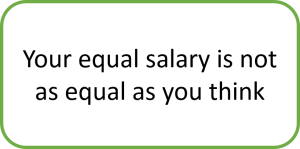 April 12th was National Equal Pay Day.
April 12th was National Equal Pay Day.
On April 11th, Microsoft posted a blog that indicated salary equity across gender and race. I applaud Microsoft and other organizations that publish their salary data. This transparency is a great first step.
It would be tempting to conclude from the information provided that there is pay equity and move on. However, salary data is not the whole story and it does not mean that there is actual pay equity.
Let’s look at the statements published on Microsoft’s blog:
“99.8 cents earned by women for every $1 earned by men with the same job title and level in the U.S.” and “$1.00 earned by racial/ethnic minorities for every $1 earned by Caucasian employees with the same job title and level in the U.S.”.
The key words are “same job title and level.”
In many organizations people can have the same job title and the same job responsibilities, but be in different pay levels. As a fictitious example, let’s take the title “Project Manager”. This is not the same as job ladders that start with Product Coordinator, move to Project Manager, then Senior Project Manager, Lead Project Manager, Project Director, and so forth. For the title Project Manager alone, there may be multiple pay bands – say level 15, 16 and 17, with the higher levels earning larger salaries and potential bonuses.
This is the first area where pay equity breaks down quickly. Let’s look at three fictitious employees:
- Employee A is a white man in pay level 17 with a salary of $80,000
- Employee B is a white woman in pay level 16 with a salary of $70,000
- Employee C is a black man in pay level 15 with a salary of $60,000
All three of these employees may be performing the exact same job duties, but Employee A has a higher salary and may also have a larger bonus, raise, and other compensation awards.
If it seems confusing how employees performing the exact same job may be in different pay levels, here is an example that is parallel to how many organizations function: consider a company that manufactures printer paper. In a team of Project Managers, Employee A is responsible for paper with recycled content, Employee B is responsible for premium paper, and Employee C is responsible for multi-colored printer paper. They all have the same day-to-day job duties and their performance can be measured in the same ways.
Employers can justify employees doing the same jobs at different pay levels by claiming differences in work experience or subjective differences in skills.
Compiling data to determine salary equity by job role vs. level is straightforward. An employer only needs to compare the data for each job title at each pay level. What is the race/ethnicity and gender breakdown for each? Let’s say there are 300 employees in each of the Project Manager pay levels from the example above. If there are 25 women in level 17 and 250 women in level 15 – you don’t have pay equity.
Bonuses and awards are another area where compensation inequity exists. People performing the same job, whether in the same salary level or not, often receive different compensation in the form of cash awards, stock awards or options, and non-cash awards such as trips and gifts of products or services.
Raises and promotions can also be inequitable. Are employees of all genders and ethnicities receiving the same percentage of salary increases? Are they promoted with the same frequency?
Publishing salary data is a critical first step. Now let’s see companies publish the gender and race/ethnicity data for:
- The same job titles at different pay levels
- The dollar value of bonuses and awards
- Raises and promotion frequency
When this data is published then it will be clear if an organization has pay equity or not. Until then, let’s remember that the salary data by pay level is only one compensation metric and it is not the whole truth.
Lets Take a Break From Politics to Complain About Our Jobs
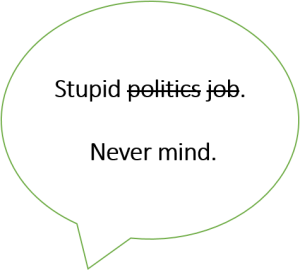 Can we just take a break from despising each other because of our political beliefs and unite in agreement that our jobs suck?
Can we just take a break from despising each other because of our political beliefs and unite in agreement that our jobs suck?
Yes, our mutual distaste for our jobs can bring us together.
What? You say you would like to complain about your job but you don’t have one?
All right, fine, circle the number below that best describes why we should scorn you for your lack of employment:
- Victim of discrimination by entitled jerks
- White male victim of reverse discrimination
- Victim of discrimination against ESL (English as a Second Language) speakers
- Lost job to overseas outsourcing
- Company shut out unionizing workers
- Unions shut out non-union workers
- Lack of access to childcare
- Vs why do you have so many kids you can’t afford
- Vs birth control is immoral
- Vs its none of your damn business
- Vs stop swearing
- Vs damn is still a swear word?
- …….
- ………..
Forget it, don’t answer. My scorn reservoir is running low anyway.
But the rest of you. You agree that our jobs suck. Thank you.
Tell me about it.
You…you’re an underemployed millennial with $50,000 in unpaid student loans. Working three jobs, living with six roommates?
Oh I got that wrong? Actually, you’re complaining about underemployed millennials. You’re an underemployed boomer competing with them for jobs.
Got it.
Let’s move on.
I mean, we can all agree our bosses are assholes, amIright?
Wait a minute, I work for myself.
I’m no saint but that’s kind of harsh.
And I like my job.
I give up.
Remembering What Was Good About A Bad Job
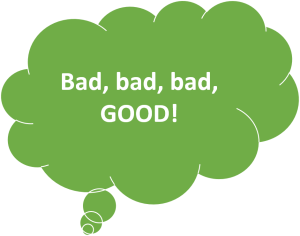 Last weekend I spent time with a friend that I met when I was at a not-so-favorite job. Let’s just say that particular job had many challenges. And not the exhilarating kind that lead to career success and personal fulfillment.
Last weekend I spent time with a friend that I met when I was at a not-so-favorite job. Let’s just say that particular job had many challenges. And not the exhilarating kind that lead to career success and personal fulfillment.
I hadn’t seen this friend in a long time and it popped into my head that her friendship was one of the best things I got from that job. We had a lot of fun while we helped each other cope.
That made me want to remember the other positive outcomes that came from a difficult work experience. Here are a few:
- I am passionate about the projects I managed and am proud of what I accomplished.
- I got to explore two specific types of marketing that I was less familiar with. I built solid skills in those areas that gave me the necessary qualifications for future work.
- I formed friendships and trusted relationships with colleagues that are still important to me.
These benefits are obvious to me, and I acknowledge them when they impact me. When I thought about it more I realized there are less obvious and more personal benefits:
- I learned what my boundaries are and sharpened the line between what I am and am not willing to do to succeed in business.
- I finally accepted that business isn’t always fair. Accepting this killed some of my idealism. However, it affirmed the type of businessperson I am and made it easier to detach from the fairness of an outcome that is not in my control.
- I changed my definition of success. Climbing the corporate ladder is only one way of evaluating success. There are many different ways to be successful in business – not to mention in life.
It takes time to recover after leaving a negative job, just as it does when leaving any significant relationship that was painful. If you’re recently out of a tough work situation I hope that you allow yourself to be angry about what wasn’t right and grieve for the hopes you had for that role.
Eventually, I hope you will also remember what you gained.


 Or the title that I prefer: My sock drawer is good for business.
Or the title that I prefer: My sock drawer is good for business.


Recent Comments